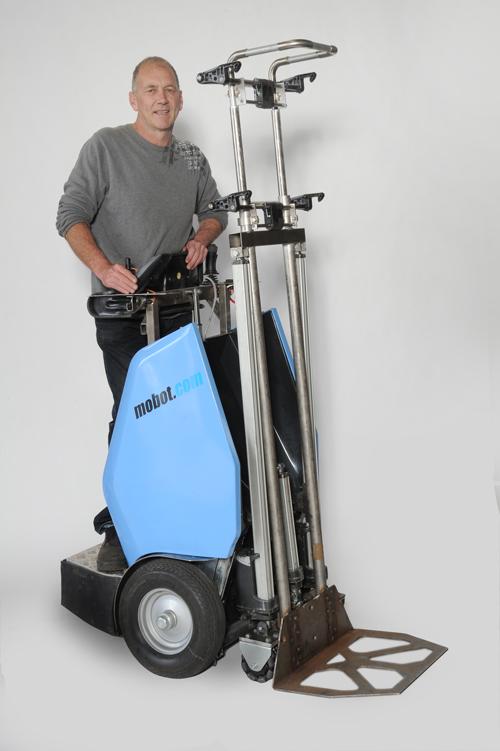If Steve Haythorne had had a Mobot when he was a logistics manager, things would have been so much easier and so much more efficient.
He watched the fleet being loaded with bread trays at Goodman Fielder Bakery, stacked 12 units high - shoulder-high - because that is as far as the stackers could manage to lift the trays. The trucks rumbled out with a 60% load of bread and a 40% load of useless air. If the trays could be stacked ceiling-high instead of only shoulder-high, Steve calculated, the company could drop one in three trucks and save millions of dollars.
The problem with loading was that the job was limited to those with strength. Not only that, but the task was also boring. There had to be a better use of man- and brainpower. Steve gave it some thought and it turned out to be one of the best thoughts of his life, although it gave him some nerve-wracking moments.
He filed a patent and found he had six months to make a prototype or he would lose the copyright so he chucked in his job, sold his house and shares for funds and built a garage to house a workshop. His dad had been a tinkering inventor, so Steve had some idea of what he was up against but it was a very scary step, the way first steps so often are. He was determined to see it through and stay motivated, reminding himself that if he would have been a grateful customer had he found such a thing in his logistics days.
It took him three years and some sleepless nights, but with the help of some R&D funds from the Government who liked the idea of an invention that would bring New Zealand to the world stage and provide some much-needed jobs along the way, and some help from a Venture Capitalist he developed the Mobot, ostensibly the world’s smallest forklift. The first year he got the concept together, the second year he called in an engineer and got the prototype together and the third triumphant year he had some demo models.
By then Fonterra had wind of it and was interested because it had the same problem loading milk crates as Goodman Fielder had loading bread crates. This added interest was just what Steve needed to be encouraged to take the idea out into the wider arena, to Australia and the USA. He travelled from San Francisco to New York City and came back with orders to fulfil.
The Mobot can carry 440lbs at 6mph 24/7. No larger than a coffee table, with zero-turning manoeuvrability the Mobot’s compact size allows it to operate inside trucks, across truck docks, narrow aisles and congested factory floors. It can go where no other forklift can.
While the Mobot is specifically designed to lift bread and milk, it can also be used in other fast moving consumer goods (FMCG) industries, super markets, light manufacturing, de-stuffing shipping containers, parcel post and military markets.
It can be used by older staff and those with less strength, two groups that often get pushed out of industries where heavy work is required and it does three times the work, three times as fast says Steve. It is fun to use and easy to drive, although Steve is currently working on an initiative where the Mobot can be driven and maintained remotely.
SPECIFICATIONS
Capacity
- Rated – 440lbs @ 12in (200kg @ 300mm) load centre
- Lift - up to 4ft (1200mm)
- Tilt – 20 degrees
Performance
- Speed , governable up to 6 mph (10 kmph)
- Endurance 15 miles (25km) or 1800 full load lifts
- LiFePO4 Batteries - 12hr shift, 4hr recharge
- Gel Lead/acid – 8hr shift, 6hr recharge
- Ramps +/- 10 degrees
- Braking distance 3ft at 6 mph (1000mm at 10kmph)
Basic Dimension
- Machine Mass (including batteries) 880lbs (400kg)
- Length – 3ft (900mm)
- Width – 31in (800mm)
- Height – 6ft (1800mm)
- Pilot standing platform height - 1ft (350mm)
- Adjustable Pilot dashboard height – 3-4ft (960-1180mm)
- Turning Radius - Zero
Features
- Left or Right Hand Drive Joy stick controllers
- Ergonomic adjustable dashboard height
- Onboard Barcode scanner and Load Cell
- Payload recognition and audit/validation
- Live data interface with ERP/WMS Systems
- Food Grade Stainless Steel construction
- IP rating 5-5-3
Safety/Compliant Standards
- ANSI/ITSDF B56.1-2009 (USA)
- AS 2351.1 & 2351.3 (AS & NZ)






